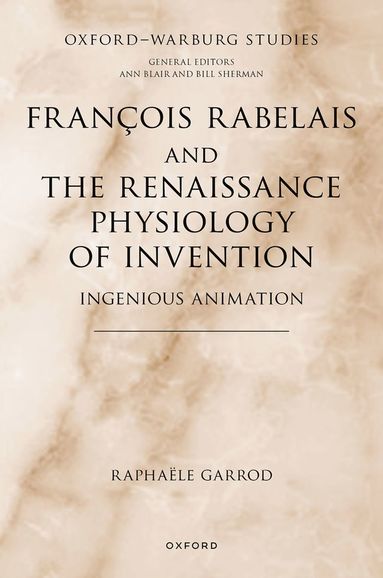
- Format
- Inbunden (Hardback)
- Språk
- Engelska
- Serie
- Oxford-Warburg Studies
- Antal sidor
- 336
- Utgivningsdatum
- 2025-01-31
- Förlag
- Oxford University Press
- Dimensioner
- 239 x 160 x 28 mm
- Vikt
- Antal komponenter
- 1
- ISBN
- 9780192866691
- 726 g
François Rabelais and the Renaissance Physiology of Invention
Ingenious Animation
- Skickas från oss inom 7-10 vardagar.
- Fri frakt över 249 kr för privatkunder i Sverige.
Passar bra ihop
De som köpt den här boken har ofta också köpt All Fours av Miranda July (häftad).
Köp båda 2 för 1803 krKundrecensioner
Övrig information
Raphaële Garrod is tutorial fellow at Magdalen College, Oxford and Associate Professor of Early Modern French at the University of Oxford. She obtained her PhD in early modern French from Trinity College, Cambridge, and went on to several postdoctoral positions in Cambridge and Australia. She was a secondary-school teacher in France before embarking on postgraduate studies in the UK. Her current work focuses on conceptions and representations of the human at the intersection between early modern intellectual history (especially history of science) and poetics in XVIth- and XVIIth-French and European texts.
Du kanske gillar
-
Releasing 10
Chloe Walsh
Häftad -
Binding 13
Chloe Walsh
Häftad -
Rewind It Back
Liz Tomforde
Häftad -
Caught Up
Navessa Allen
Häftad -
All Fours
Miranda July
Pocket -
Keeping 13
Chloe Walsh
Häftad -
Onyx Storm
Rebecca Yarros
Häftad


